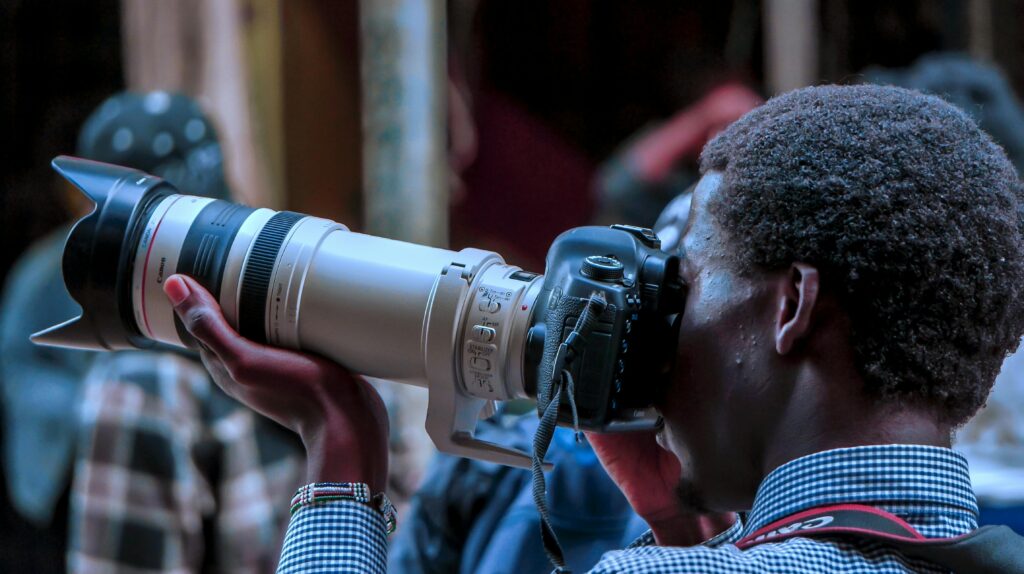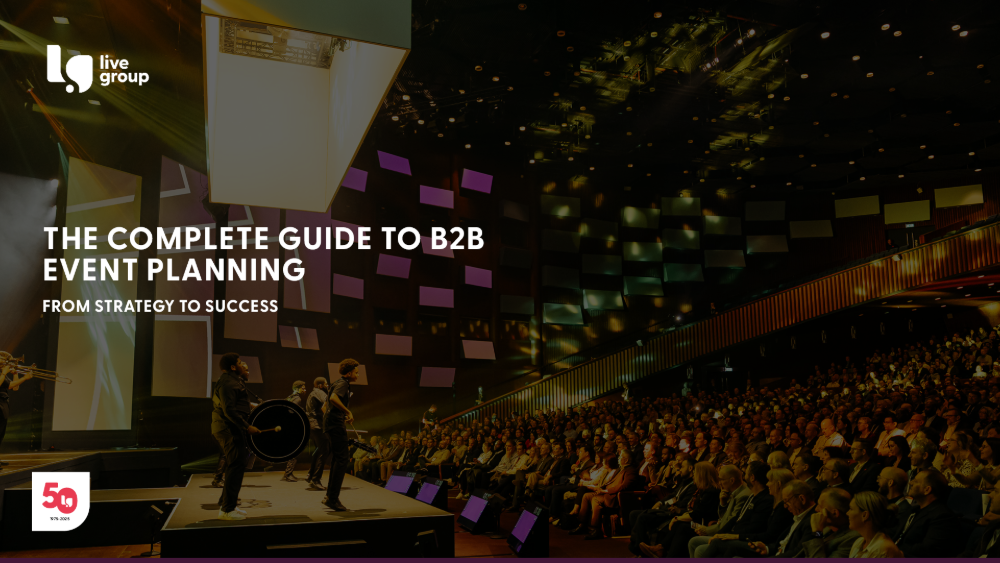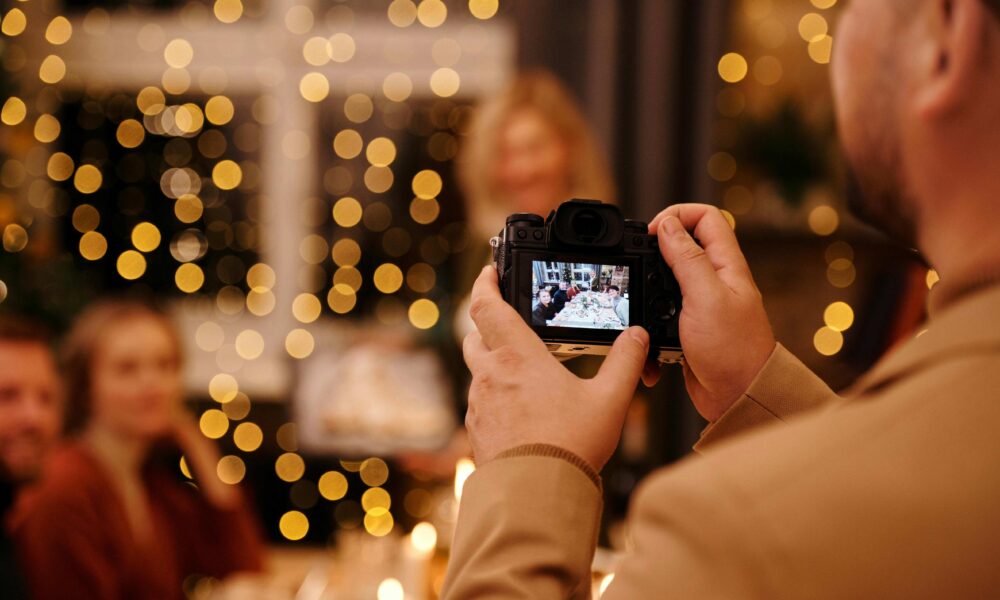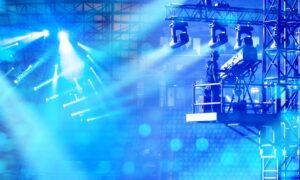Why great event photography matters more than you think
There’s one part of every event that lives on long after the last canapé is eaten and the lanyards are tossed in a drawer: the photos. A good event photographer will document what happened, a great one will shape how it’s remembered. Whether you’re planning a conference, an awards dinner, or a team summit, corporate event photography can make your hard work look effortless.
If the event ran smoothly but the photos are flat, people will assume the whole thing was underwhelming. Great imagery reflects your professionalism, your brand, and the energy you’ve worked so hard to create. Event photography isn’t vanity. It’s visual proof of success.
So, what should you expect from an event photographer? How do you find the right one? And what’s a fair price for professional event photography? This article breaks it down.
1. What does an event photographer do?
The simple answer is: far more than “take photos.”
A professional event photographer is part documentarian, part storyteller, and part problem-solver. They know how to anticipate moments, like the handshake that seals a deal, the speaker’s punchline that makes the room laugh, the quiet pride on a team member’s face during a standing ovation.
They adapt to everything. Unpredictable lighting, fast-moving schedules, people who’d rather not be photographed (there’s always one). The corporate event photographer’s goal, as well as technical perfection, is emotional accuracy: the shot that feels right, not just looks right.
In corporate event photography, this skill is vital. Unlike staged product shoots or weddings, corporate events often involve tight timeframes, strict branding rules, and high-profile guests. The best photographers know how to blend in and stay alert, capturing natural, flattering shots that fit your organisation’s tone.
In short: event photographers aren’t there to be noticed. They’re there to make sure your event is. should align with broader business goals and will later help in evaluating the plan’s success.
2. Why hire a specialist event photographer instead of a generalist?
Photographers, like chefs, tend to have a speciality. Sure, a generalist can technically handle any subject, but would you hire a pastry chef to run your barbecue?
The same applies here. A corporate event photographer understands what businesses need: clear branding, professionalism, confidentiality, and consistency. They know how to frame the keynote speaker so that the sponsor’s logo is visible, or how to capture a crowd shot that looks inclusive and dynamic.
A wedding photographer might excel at emotions; an event photographer excels at context. They can switch from wide-angle venue shots to detailed close-ups in seconds, all while juggling changing light and constant movement.
If you’re in a big city like London, search specifically for a corporate event photographer London. Those who regularly shoot in conference centres or hotels will already understand the logistical quirks such as lighting, access rules and security checks.
B2B Event Planning Guide 2025
Download the 2026 B2B Event Planning Guide
3. What to look for in a professional event photographer
Most event photographers can take a decent picture. What separates the great ones is everything else.
Consistency matters. Don’t just skim the first five shots on their website. Look for full galleries. Do they maintain the same quality in dimly lit rooms? Do people look natural, not posed or startled?
Professionalism counts. If they don’t have insurance, skip them. Reputable photographers will have business insurance and can provide a Certificate of Insurance (COI) on request, especially if your venue requires one.
Punctuality and reliability are non-negotiable. The best photographers show up early, scout the location, and test lighting before the first guest arrives. If they’re late to your first meeting, that could be a red flag.
Personality matters more than gear. You want someone who can blend into the room. Confident but not intrusive. A photographer who interacts warmly with your guests will capture better expressions every time.
In short: professionalism, personality, and preparation are worth more than any fancy camera spec.

4. How to find an event photographer near me
Finding the right photographer isn’t just about scrolling Google and picking whoever ranks first (though that’s a start). It’s about finding someone who gets your event’s purpose.
Start local. Search phrases like “event photographer near me” or “corporate event photographer London”. You’ll quickly find a mix of freelancers and agencies. Check their websites – real professionals will have portfolios, testimonials, and a proper email address, not a random Gmail.
Ask your venue. Event spaces often keep lists of recommended suppliers. If they’ve hosted similar events before, they can point you to photographers who already know the layout and lighting conditions.
Look on social media. LinkedIn, Instagram, and local Facebook groups are goldmines. Browse recent event photos in your area; many will credit or tag the photographer. That’s an easy way to find someone whose style aligns with your brand.
Freelancer platforms. Upwork, Fiverr, or Bark, where you can browse portfolios, compare rates, and read verified client reviews. Just remember: cheaper isn’t always better. Experience, equipment, and reliability matter just as much as cost.
Ask peers and suppliers. Your AV company, event planner, or caterer may have worked with reliable photographers before. Word-of-mouth recommendations are often more trustworthy than online reviews.
A final tip: when you find someone you like, check their consistency across platforms. A professional who presents themselves well everywhere – website, LinkedIn, email – usually handles clients the same way they stay in sync with what external audiences are hearing.
5. How to prepare before you even contact photographers
Preparation makes everything smoother (and cheaper). If you know exactly what you need, you can brief your photographer clearly and avoid misunderstandings later.
Start by asking: what are the photos for?
Marketing? Social media? Internal comms? A glossy report for the board? Each purpose might need a slightly different approach.
Consider creating a simple mood board of event photos you like. This helps the photographer understand your visual tone – natural vs. polished, candid vs. posed.
Then build a short shot list. Think: key speakers, networking moments, venue atmosphere, sponsor signage. A professional event photographer will refine that list with you, suggesting shots you might not have thought of.
Finally, share practical details: event timings, lighting setup, and any tricky logistics. If you’re hosting at a new venue, consider offering a quick site visit. A 15-minute walkthrough can save hours of guesswork later.
6. What questions should you ask when hiring an event photographer?
This is where many organisers trip up – not because they don’t ask questions, but because they ask the wrong ones.
Here are the questions that actually matter:
- “How long have you been shooting events?”
Experience brings adaptability. Every venue has its quirks. - “Do you have photography insurance?”
Non-negotiable. Some venues won’t even allow uninsured photographers through the door. - “Can I see a full client gallery?”
Not just the highlight reel. You’ll learn more from seeing 100 consistent shots than five perfect ones. - “What’s included in your editing process?”
Some photographers lightly retouch; others fully colour-grade and crop. Be clear on expectations. - “How will you deliver the photos?”
Professionals often use online galleries like WeTransfer, Google Drive or Dropbox. - “What’s your turnaround time?”
For most corporate event photography, 5–10 business days is standard – but urgent previews for social media can often be arranged.
The point isn’t to interrogate. It’s to confirm you’re hiring someone who treats photography as a serious business.
7. Understanding event photographer prices
“How much does a photographer cost for an event?” is a fair – and frequent – question. The honest answer: it depends.
Most event photographer prices are based on:
- Duration (half-day vs. full-day rates)
- Travel time and expenses
- Equipment and assistants
- Editing hours
- Licensing and image rights
In London, corporate event photographer rates typically start around £500–£800 for a half day, rising to £1,200–£1,800 for a full-day shoot. Multi-day conferences or complex briefs (e.g., same-day edits, live social media coverage) will cost more.
Beware the £200 “bargain.” Low prices often mean cut corners – poor editing, missed moments, or no backup gear. You’re paying for experience, reliability, and peace of mind. The key is transparency. A professional will outline exactly what’s included – number of edited photos, delivery time, format – so there are no surprises.
8. Setting expectations on the day
On event day, your photographer should feel like part of the crew, not a distraction. Expect them to be early, quietly efficient, and everywhere at once.
They’ll typically work in the background, capturing candid moments, but may occasionally step in to direct group shots or key moments. A good one knows when to vanish, and when to politely take charge.
Keep communication open. A quick check-in during breaks helps ensure they’ve captured everything on your list. And if something unexpected happens – a surprise speaker, spontaneous award, or emotional moment – trust them to adapt. That’s what professionals do best.
9. After the event: delivery, editing, and follow-up
Your event photographer will cull thousands of shots down to the best few hundred, apply colour correction, cropping, and subtle retouching, then upload them to a private gallery.
Most professionals deliver final photos within one to two weeks. For big corporate events, you might get a preview set sooner – ideal for press releases or social posts.
Before sharing, confirm usage rights. Most photographers allow unlimited use for internal and marketing purposes, but commercial advertising may require additional licensing.
After delivery, take a few minutes to review and give feedback. It helps both parties refine things for next time – and if the experience was great, a testimonial goes a long way.
Final Thoughts
Choosing the right event photographer isn’t about ticking a box. It’s about finding someone who can see your event the way you do – or even better.
When done well, corporate event photography will amplify your success. Those images become the moments your team, clients, and audience will remember long after the stage lights dim.
Take your time, ask the right questions, and invest in a professional event photographer who understands your story. The event will end, but the pictures will keep talking for years.
Download the B2B Event Planning Guide for the complete playbook to planning events in 2025-26

Ready to take the stress out of event planning?
Chat to us today about how our delegate management services can help bring your next event to life – on time, on budget, and beyond expectations. Whether you need full-scale delivery or targeted support, Live Group is here to help.





